Long term fight against NCDs

FIGO’s Committee chairs and members around the world make a critical contribution to the achievement of the Sustainable Development Goal 3: Health For All at local, national and international levels.
On the frontline of women's health throughout 132 countries, they donate their time, expertise and platofrms to improve the physical, medial, reproductive and sexual health and wellbeing of women throughout their lives.
We are proud to celebrate the contribution of Professor Moshe Hod, Chair of FIGO's Pregnancy and NCDs Committee, from Israel who shares his motivation to improve intergenerational health:
"I am focused on highlighting the issues and impact of pregnancy complications in the long term fight against non-communicable diseases (NCDs), a critical issue for FIGO’s advocacy and activities.
Globally there are roughly 130 million annual deliveries, with about 90 percent of them in low and middle-income countries. Women in these settings face most of the maternal, fetal and neonatal complications but ironically most of the research and the guidelines on how to manage these pregnancy complications comes exclusively from high income settings. As such, solutions are not always available or applicable.
As chair of the FIGO Committee on Pregnancy and NCDs I am fortunate enough to volunteer with an outstanding group of global experts on maternal and fetal health, from across a range of resource-settings. Together, we led the development and production of a number of guidelines and adaptable solutions to address the unmet perinatal needs of all women, everywhere.
There is a growing global pandemic of NCDs, and this has meant a very active, urgent time for our Committee. Key areas including Hyperglycemia in Pregnancy, with our Global Declaration launched at the FIGO World Congress in Rio de Janeiro, and postpartum follow up care for mothers who have had pregnancy complications.
Women's health has been a focus of mine for 40 years, since I trained in Chicago with the late, great Prof. Norbert Freinkel. He taught that pregnancy and the intrauterine environment are cornerstones for the future health of the mother and at least the next two generations of her offspring.
We affirm the phrase that ‘maternal health is a nation’s wealth,’ with pregnancy as the small window of opportunity to interrupt the vicious cycle of future NCDs. The understanding that we have the ability to potentially control the future health of at least three generations has encouraged me throughout my professional life to look for innovative solutions to address the many unmet needs of the mother and her offspring.
There is always debate on process and method, and there are always challenges. We welcome opportunities for sharing and discussion, and every member of the Pregnancy and NCDs Committee has been busy this year with a number of sub groups working on our six different initiatives:
- Hypertension
- hyperglycaemia
- nutrition and obesity
- post pregnancy follow up
- foetal growth
- cost effectiveness of interventions.
The release and promotion of the guidelines on the prediction and prevention of pre-eclampsia was a huge achievement and one the Committee should be particularly proud of. They have been hugely popular and we really hope they will make a difference to the mothers for whom pre-eclampsia is a real threat, both to them and their children long term.
Throughout my life I have volunteered for different organisations, and in the last few years I have reached a position where I am able to reach and really make an impact on a global audience. It is a truly wonderful feeling to be in this position, with the opportunity to help improve health on this scale.
FIGO is an admirable organisation with a unique opportunity to lead OBGYNs and the wider community in improving women’s health. Volunteer efforts are central to this.
We are all committed to galvanising momentum on critical issues, collaborating across the board to ensure we are developing and implementing best practice for mothers and their offspring in every FIGO Member country and beyond".
This piece appearsas part of a wider series celebrating FIGO volunteers. Find more stories here.